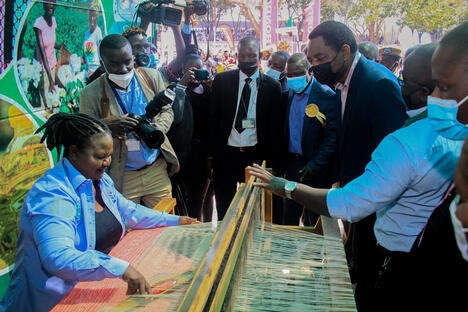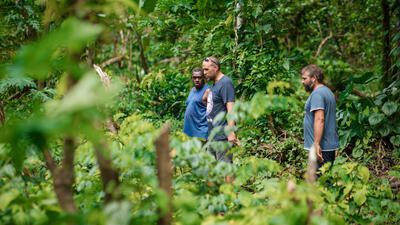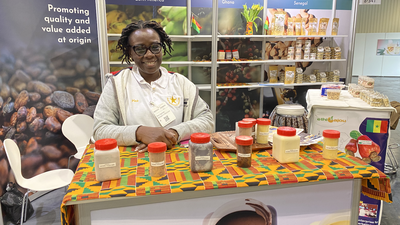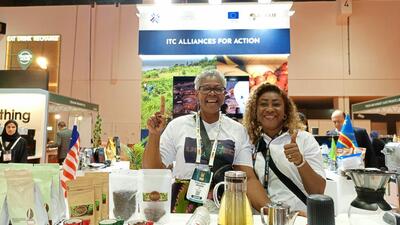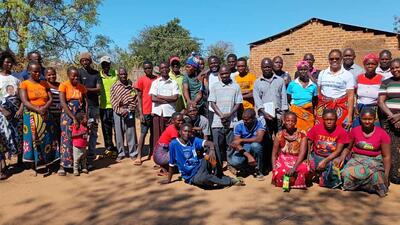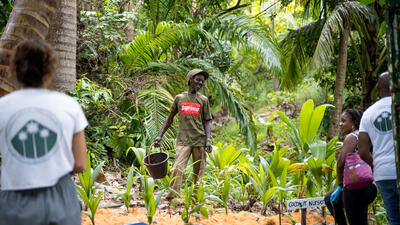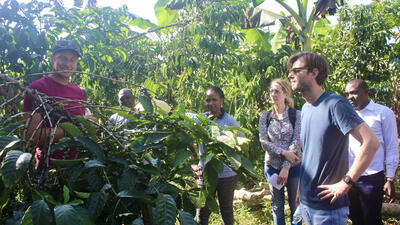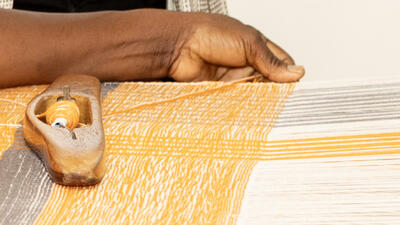
Spinning cotton into gold: Zambia scales up handloom textiles
ITC is supporting Zambia’s Handloom Textiles Association to improve and scale up its artisan textile business to diversify from raw cotton exports and benefit local women.
Cotton farmers in Zambia have learned new ways to supplement the incomes earned from their crops, by hand spinning yarn and weaving artisanal textiles.The Handloom Textiles Association of Zambia (HATTAZ) was established to promote this work. This initiative, led by the Cotton Association of Zambia with support from the International Trade Centre (ITC), has already left a positive imprint in villages across the country.
Spinning yarn and weaving cloth lets smallholder farmers add value to their cotton, so they earn more from their crops. It also fosters a community of local farmers, spinners and weavers who have joined forces to collectively improve their livelihoods and uplift their communities.
ITC and HATTAZ are teaching women across Zambia how to weave, but also giving business and marketing training though the ACP Business-Friendly programme, jointly funded by the EU and the Organisation of African, Caribbean and Pacific States (OACPS).
So far, 25 farmers have learned hand yarn spinning while 15 have studied advanced weaving. The goal is for them to share their knowledge with their home communities. Each farmer group also received weaving and spinning packages that include handloom machines, reeds, spinning wheels and yarn.
To improve their market access, members of the initiative are participating in trade shows, international fairs and district shows to improve their visibility and market access.
In July, they attended the Zambia Agricultural and Commercial Show, a leading meeting place in Southern Africa for investors and businesses seeking new opportunities. This was a valuable opportunity for the handloom textiles collective to exhibit their locally-made artisan products – beautiful, unique, and with a social impact to boot.
The event was a success at every level – networking with new buyers and investors, increasing national visibility and capturing ideas and inspiration for market development.
Weaving to grow incomes
Francisca Chisuta is a weaver from the Mazabuka district in Zambia’s Southern province. For her, the event was both exciting and motivating.
“I’m so proud to represent my group at a national level” she said.
“I’m also taking away some important lessons I plan to share with them. For example, the importance of a good display to attract customers, and new ideas on pattern and colour combinations I can’t wait to try out!”
Zambian President Hakainde Hichilema visited the stand, where HATTAZ members explained to him the challenges they face in the cotton sector, and the importance of investing in value addition in-country to move forward.
The president listened and requested ministerial briefs on the topic – a big win for Zambia’s cotton and textile industry.
Tourism Minister Rodney Sikumba also visited and encouraged HATTAZ to organize to apply for government funding. Linking fashion, the hotel industry and tourism -- with an emphasis on women empowerment -- is high on the government’s agenda, he said in his speech.
Connecting with the Technical Education, Vocational Education and Entrepreneurship Training Authority was also a networking milestone. The training authority expressed interest in working with HATTAZ and funding future training – a huge opportunity for all women weaver groups.
Apart from enabling trade fair participation, ITC is also working closely with HATTAZ on improving market access through website development and database expansion, to help farmers market their products and to sell them online. Groups already producing high-quality textiles have already made connections with fashion designers through this programme.
Providing farmers with the opportunity to add value to their cotton is building resilience to price and weather shocks, as farmers diversify risk and income by selling cotton-based woven products. These additional earnings help support their families and businesses year-long.
Moving forward, HATTAZ plans to help improve its members’ exhibition, marketing, and negotiation skills with continued support from ITC and the ACP Business-Friendly programme.
About the Programme
The ACP Business-Friendly Programme is funded by the European Union and the Organisation of African, Caribbean and Pacific States (OACPS) and jointly implemented by ITC’s Alliances for Action, the World Bank and UNIDO.
It seeks to improve the ability of agribusiness firms in ACP countries to compete, grow and prosper in domestic, regional and international markets. Through the Alliances for Action approach, it promotes inclusive and sustainable agricultural value chains that value all stakeholders from farm to shelf.
Alliances for Action is an ITC initiative that seeks to transform food systems through producer partnerships that cultivate ethical, climate- smart, sustainable agricultural value chains.




